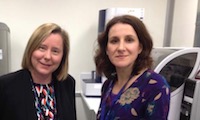The National Foundation for Medical Research and Innovation has implemented a strategy focused on supporting gap areas along the innovation pathway for biomedical research.
This targeted support assists researchers to advance their research towards the development of new innovations including medicines, vaccines, diagnostics and devices. These innovations normally require regulatory approval, commercial partnerships and investors as they progress. Learn more.
| Prof Roger Chung |
| Macquarie University |
| Amyotrophic lateral sclerosis |
| Therapeutics |
- Establishment of spin-off company, Celosia Therapeutics ($2 million seed funding followed by series A of $16.5 million)
- Fight MND Foundation Impact Grant, $250,000
- Fight MND Foundation Drug Development Grant, $1,000,000
- NHMRC Ideas Grant, $794,115
- Prof. Chung was awarded the 2023 NHMRC Marshall and Warren Innovation Award
| Prof Nicholas Opie |
| The University of Melbourne |
| Paralysis |
| Device |
Key outcomes:
- Establishment of spin-off company, Synchron which is now valued at approximately A$1.5 billion
- Released its first-ever public demonstration of an individual using an iPad controlled entirely by thoughts in August 2025
- Successfully raised over A$212m, including A$110m (Series C)
- Received seed funding from the U.S. Defense Advanced Research Projects Agency (DARPA) ONR Global and the U.S. Department of Defense (DoD), $1,331,325 + $154,823
- Successfully implanted the StentrodeTM into four participants with severe paralysis due to MND
- StrentrodeTM granted Breakthrough Device designation by the U.S. FDA
- Synchron received nearly $1m from the MRFF
- $1,651,685m NHMRC project grant to expand the clinical study of the StrentrodeTM
- NHMRC Development grant, $810,382
“This project received funding in 2017-2018 from NFMRI to support safety validation of the StentrodeTM, which was developed by A/Prof. Nicholas Opie and his team. The StentrodeTM is an end-vascular brain-machine interface that can record neural signals from within a blood vessel. This technology is designed to restore instrumental activities of daily living in people with paralysis by sensing brain activity and translating these signals into discrete electrical commands which enable direct brain control of computers and assistive technology”
| Prof Steven Wise |
| The University of Sydney |
| Cardiovascular |
| Treatment |
Key achievements to date:
- Successful establishment of spin-off company NanomedX with private seed funding of over $790,000
- Sydney Local Health District – Accelerating Translation of New Cardiovascular Devices and Materials, $361,752
- Heart Foundation Future Leader Fellow Level 3, $593,126
- NSW Cardiovascular Initiative, $727,423
- MTPConnect TTRA Research Project, $739,128
- NSW Cardiovascular Senior Scientist Grant, $746,488
- University of Sydney FMH Biomanufacturing Incubator, $250,000
- MRFF/TTRA Program, $750,000 to help drive the innovation towards human trials
| Prof Wendy Cooper |
| Royal Prince Alfred Hospital |
| Lung Cancer |
| Diagnostic |
Key outcomes:
- Prof Cooper’s team now routinely screen all lung adenocarcinoma cases.
- Awarded a landmark $14.7m Frontier Health and Medical Research grant for groundbreaking lung cancer liquid biopsy trial
- Cancer mutation testing is being used to characterise tumour pathology and identify suitable and personalised drugs for patients
- Approval of new therapies and concurrent diagnostics by PBAC and MSAC
- New clinical trials in association with pharmaceutical companies are being undertaken.
- in 2017, Prof Cooper was awarded the John Raftos Medal for her innovative research and its application.
“I am extremely grateful for the wonderful opportunities the funding from NFMRI have given me and my research team. I am proud that we are making an impact on lung cancer diagnostics in Australia.”
| Prof Michael Good AO |
| Griffith University |
| Rheumatic Heart Disease and Streptococcus A infections |
| Vaccine |
Key outcomes:
- Development collaboration with major pharmaceutical company and anticipated commercialisation through Australian NewCo establishment in 2023/2024
- Currently in Phase 1 clinical trial overseas
- Investment from industry
- Leveraged $3.5m from the Heart Foundation
- Leveraged over $750,000 of funding from external sources including Lowitja, Snow Foundation etc.
- $550,000 in funding and over $500,000 in kind to fund a Phase 1 clinical trial from the Li Ka Shing Institute (Canada)
“NFMRI funding for our streptococcal vaccine project has provided critical leverage to enable us to secure funds for the clinical aspects of our Phase I trial, which would not have been possible without the ability to produce GMP-grade vaccine and to undertake formal toxicology studies on the vaccine. If the vaccine is successful, then much credit will be owing to NFMRI and their willingness to help us through this important phase in vaccine development”
| Prof Janet Davies |
| Queensland University of Technology |
| Grass Allergies and Asthma |
| Vaccine and Diagnostic |
Key highlights:
- Attracted co-sponsorship from potential industry partner, Abionic Switzerland to test the utility of allergens of subtropic Bahia and Bermuda grass pollen to function as an active ingredient in a nanotechnology point-0f-care diagnostic platform
- Research collaborations with ThermoFisher Scientific Sweden, Abionic Switzerland and Stallergenes Greer, France, Sullivan Nicolaides Pathology and Abacus dx
- Dr Davies was promoted to Associate Professor and then Professor
- Recombinant allergens have been optimised and verified by Abionic
- Newly designed, expressed and purified allergen components successfully assessed for quality by mass spectrometry by APAF
“I am and will remain grateful for having received the financial support from the Foundation and for the opportunities the grant afforded me. Perhaps beyond the tangible, the greatest benefit may well be the learning and growth in knowledge and experience in the commercial side of translation that this project has provided.”








